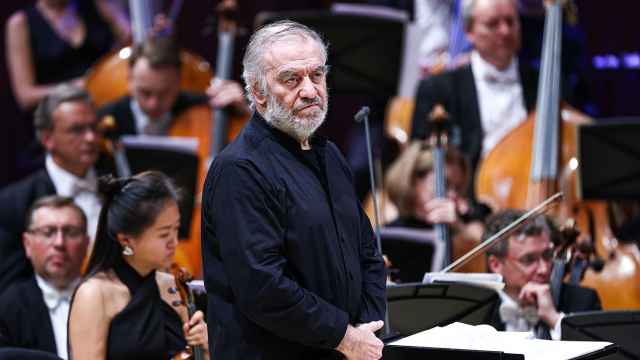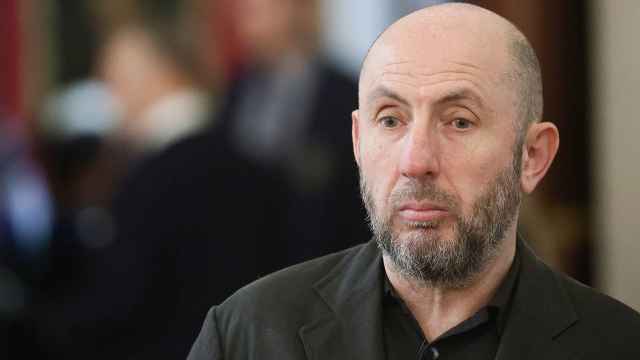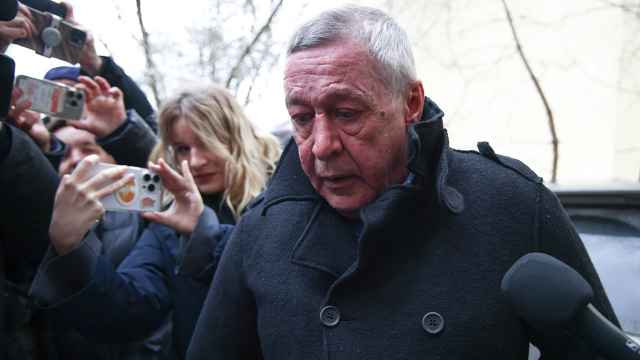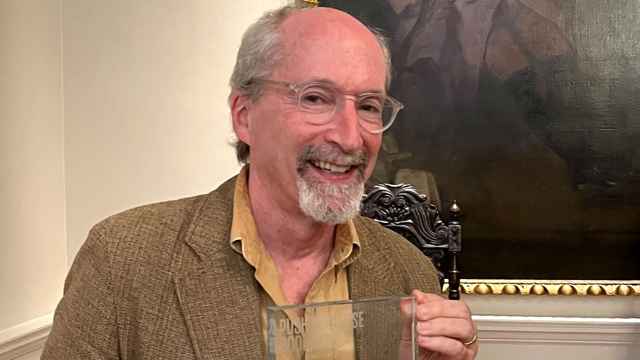An interesting thing happened this year &mdash a trio of playwrights who first appeared on the horizon less than a decade ago went the way of the big screen with big success. They're not all making their firsts forays into cinema, but the quality of their work this year has really made people stand up and notice.
The Kinotavr festival in June put a big exclamation point on all this. Vasily Sigarev, the internationally-renowned playwright from the Urals region, came out with his debut as a director and screenwriter and pulled down the festival's grand prize for "Spinning Top." For good measure, his wife Yana Troyanova &mdash also making her film debut &mdash was honored as Best Actress. Right alongside Sigarev was Ivan Vyrypayev, whose film "Oxygen" grabbed the Critics' Prize, Best Director and Best Music. Both of these playwright/film directors created films based on their own plays.
Earlier in the year, when Valeria Gai Germanika was raising eyebrows with her tough youth-oriented film "Everybody Will Die But I Will Remain," it was Yury Klavdiyev peeking out from behind the credits as the main inspiration in a screenwriting team that included Alexander Rodionov and Olga Shuvalova.
These aren't just cases of talented writers getting a chance to see their names on screen. Lots of writers &mdash very good ones, too &mdash have had crossover vanity projects that were great for the resume but didn't do much in the way of changing the world of cinema. In the cases of Sigarev, Klavdiyev and Vyrypayev (who already has one award-winning film under his belt, 2006's "Euphoria"), we are talking about important writers potentially having a serious impact on the quality, the themes, the style and the prestige of Russian film. Call these guys the Tom Stoppards and Harold Pinters of Russia. I say that in part because they appear to share the ability to work ably in the two distinct genres &mdash theater and film. I also say it because one must hope that, like Stoppard and Pinter, Sigarev, Vyrypayev and Klavdiyev will not abandon theater and go exclusively "Hollywood."
Vyrypayev's "Oxygen" made a wildly unexpected transformation to the screen. When he began performing his play at Teatr.doc in 2002, it resonated throughout the theater world. Klavdiyev, for one, has said seeing a touring performance of the play in Tolyatti shortly thereafter changed his life and made him believe in the possibilities of theater. But theater is small and local. Film is big and global. And while the intimate, two-way dialogue of Vyrypayev's "Oxygen" may strongly affect audiences of 50 or even 100, it never could have had pretentions of mass appeal.
In fact, I'll make a confession. When "Oxygen" opened at Teatr.doc, I was intrigued by the play but baffled by the fanatic responses that followed from the critics. I found it to be a sincere and interesting play, presented and performed with honesty, but nothing more. Something along the lines of the then-popular, cute and sentimental monologues from Yevgeny Grishkovets, though rather less cute and sentimental. Then last year I was asked to create the English subtitles for the film Vyrypayev was working on and I had an opportunity to make much closer contact with the work.
Looking at the text alone, my original response did not change. Interesting, yes. Clever, yes. But hardly enough to induce me to share the dithyrambs others had experienced.
But when I saw the as-yet unfinished film I was thrown for a loop. This small play had taken on a completely new life on the big screen. As can be seen in this internet teaser, the film is a tour de force of experimentation that involves excellent acting, superb camera work, computer graphics, animation and innovations in music inspired by, but not merely copying, the MTV experience. You can see more teasers here:
The basic themes of "Oxygen," the movie, are bracing, to put it lightly: murder, betrayal and the ambiguous impulse to achieve freedom, among others. But they all are presented and contained in a lively, colorful and attractive melange of brief, hard-hitting, dynamic scenes. And did I forget to say that this movie is as tender as it is funny as it is devastating? That's always a sign of somebody working on a high level &mdash when the horror and the humor interlock so that you can't quite tell which one is getting the upper hand.
Vyrypayev's use of music is deceptively simple and highly effective. He structured the film like an album of songs, employing each track to push the story further and deeper. His use of repetition &mdash of words, images and melodies &mdash is reminiscent of a composer working with motifs and refrains.
The film critic Dmitry Savelyev is on record as calling "Oxygen" a "radical spectacle" and declaring that it is "difficult to call it a film in the usual sense of the word." I understand Savelyev's dilemma in defining this piece. For myself, though, I'd just call it the best Russian film I've seen this year.
If you think I'm biased because I played a minuscule role in the film coming out, you need not take my word for it. "Oxygen" is playing most nights at 11:05 p.m. at the Pyat-Zvyozd cinema near Novokuznetskaya metro station. Take a look at what happens when a good playwright turns his mind to making a good film.
A Message from The Moscow Times:
Dear readers,
We are facing unprecedented challenges. Russia's Prosecutor General's Office has designated The Moscow Times as an "undesirable" organization, criminalizing our work and putting our staff at risk of prosecution. This follows our earlier unjust labeling as a "foreign agent."
These actions are direct attempts to silence independent journalism in Russia. The authorities claim our work "discredits the decisions of the Russian leadership." We see things differently: we strive to provide accurate, unbiased reporting on Russia.
We, the journalists of The Moscow Times, refuse to be silenced. But to continue our work, we need your help.
Your support, no matter how small, makes a world of difference. If you can, please support us monthly starting from just $2. It's quick to set up, and every contribution makes a significant impact.
By supporting The Moscow Times, you're defending open, independent journalism in the face of repression. Thank you for standing with us.
Remind me later.






